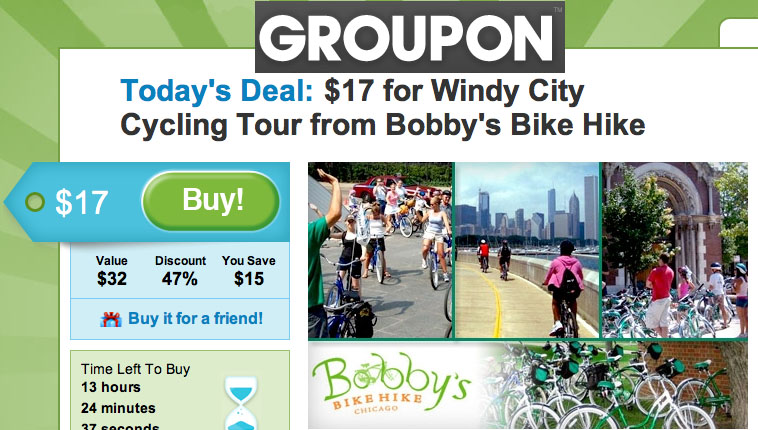Steal this idea! Hot new revenue for news
How does this sound? A million dollar revenue stream that requires only a salesperson or two, some web support and off-the-shelf e-commerce and newsletter tools? It caught my eye. And I’m suggesting you steal the idea for your local news operation fast before national competitors own the market.
The idea is Deal Brokering. You use your knowledge of the local scene, your brand and your contacts to negotiate group deals with local businesses from bars to restaurants to dry cleaners. The businesses offer big one-time discounts to attract new customers, your audience gets access to great deals, and you broker the deal on your site and get a substantial cut of the money. It’s already happening around the country.
Online startups like Groupon and Living Social offer one local deal a day, which is conveniently pushed to you through e-mail or cell phone.
Each deal is usually 50 percent off or more, good for just one day, and specific to your city. I’ve seen deals on organic food, massages, hair styling, dry cleaning, acupuncture, dental checkups, online book printing, gym memberships, belly dancing classes, and much more. Yet the most common deals, and probably the best sellers, are restaurant, bar and entertainment gift certificates. I have yet to see a deal repeated.
The beauty of the model is its simplicity. It is easy and fun to see one deal a day, presented with humor or sparkle. I dislike lists of deals provided by groups like Travelzoo.com or Restaurant.com that require combing through offers to see if any are relevant. And the new deal services make it easy to buy the day’s deal and share it with friends. They also provide incentives to get people to share the deals through their social networks.
Here’s how a single deal with a local restaurant works from the customer’s perspective. After registering for a daily email or text message, one day I see a $65 gift certificate for a restaurant I’ve been hearing about — price is $30. I click it, buy it with Paypal or a credit card and receive a certificate with a unique deal code. I go to the restaurant, show my gift certificate on paper or cell phone, and have a great meal (since food always tastes better at a 50 percent+ discount.) I can only use the certificate once, so I order a little more than its value and pay tax, tip and the amount over $65.

Now, here’s the value from the restaurant owner’s perspective. I pay nothing upfront for marketing to thousands of people in my area. I receive half the money collected by the deal-brokering organization. Typically, I can count on maybe 25-30 percent of the people who buy the certificates to never show up. The money I receive should cover my actual costs for food and drink for the 70-75 percent who redeem the certificates. Any spending over $65 gives me income at my regular prices. My restaurant is busy, word-of-mouth buzz rises, my serving staff get tips on the full bill and some of those new customers come back again at full prices.
Now, here’s how it looks from your news organization’s perspective as the deal broker. I have a valuable new service to offer that can bring people to my site and get them registered for a daily e-mail list. I have a valuable new service to offer businesses in my area — risk-free marketing. On top of that, I get half of the money that comes in on each deal (a percent that can be negotiated up or down.) As we’ll see in a minute, that money can be huge. Plus, I build loyalty and traffic for my site, as folks spread word on the deals through their social networks. And my costs are reasonable – one salesperson or two to manage the program and some IT support for the email newsletter app and ecommerce page on my site. My fulfillment involves sending a receipt with a unique deal code to each buying customer (a feature of e-commerce tools) and sending a list of names and deal codes to the restaurant so the owner can check off codes as they are used. (Don’t want those codes used twice!)
And what’s the income? A restaurant in Minneapolis, Minnesota offered the deal described above through Groupon and 860 people bought it. The deal earned a total of $25,800. The restaurant got $12,900, Groupon got $12,900 and the deal buyers potentially saved over $30,000. According to Mark Desky, vp of marketing for Groupon, deals have ranged in cost from $3 for quick food restaurants to $450 to rent an exotic car for a day. He says one deal for tickets to the Chicago Auto Show attracted 15,000 buyers.
The businesses that I spoke with loved this deal experience. They received actual money, rather than being asked to provide free gift certificates in exchange for ad spots or radio mentions of their businesses. They immediately see the results of the promotion. And they say some customers are coming back again.
If your news organization can average a deal like the restaurant example above every weekday excluding holidays, you can earn over $2.5 million annually ($12,900 x 200 days). For a small organization in a small market, maybe you average 86 sales a day (one tenth of the volume) or $258,000 annually before expenses. And, of course, you get the added benefit of building your online community and extending your relationships with local businesses.
I’ve described one system. But you can be a deal broker in many ways. Ask your audience what they want to buy and then go out and cut a volume deal with a computer seller, a broadband provider, an airline, a theater, grocery stores, events… anything. You get closer to your audience and learn what they want, which is helpful in selling other advertising. Or ask local businesses if they bought too many goods and want help clearing the inventory fast. For local startup news organizations, even occasional sales like this might add desperately needed cash and a new revenue stream.
There are many online or mobile coupon services, from Yowza to Coupon Sherpa. But deal-brokering is different. It is about community and buzz and that means strong local news organizations potentially have an advantage over national startups. They know their audience and their market, have relationships with local businesses, know which businesses are high-quality and buzz-inducing, and can promote the deals and the brokering service on their media platforms, whether in print, radio or online.

In fact, Living Social partners with the Washington Post, placing its deals on the paper’s online “Going Out Guide.” Living Social CEO Tim O’Shaughnessy says his company is interested in local news media partnerships. And he argues that companies like his have an advantage in deal brokering, since Living Social produces some of the most popular Facebook applications and knows how to serve online communities. O’Shaughnessy says deal brokering involves customer service – something he feels is thin for local news outlets. Folks interested in exploring partnership should contact Jake Maas.
Groupon says it has a patent pending on its model. But patents must be for products or processes that are unique and it’s hard to see how Groupon can claim to have invented group buying or online sales of discounted products and services. While executives at both Groupon and Living Social agree the model seems straightforward to copy, they point out there is an advantage to being the first to build a deal community in a town. Businesses and buyers like to participate when they see many people in the network. And both companies offer incentives to people to sign up others in their social networks.
Groupon is already in 40 cities; Living Social is in 9. Both are moving fast to enter others. You could offer one advantage to businesses by paying them faster — Groupon pays in three chunks over 60 days. Living Social says it pays within 10 days.
Instead of watching startups take over yet more of the advertising that now goes to news organizations, let’s move fast to seize this opportunity. I would love to hear your thoughts on what it would take to implement this for your news site and what other forms of deal brokering might excite your audience.

Comments